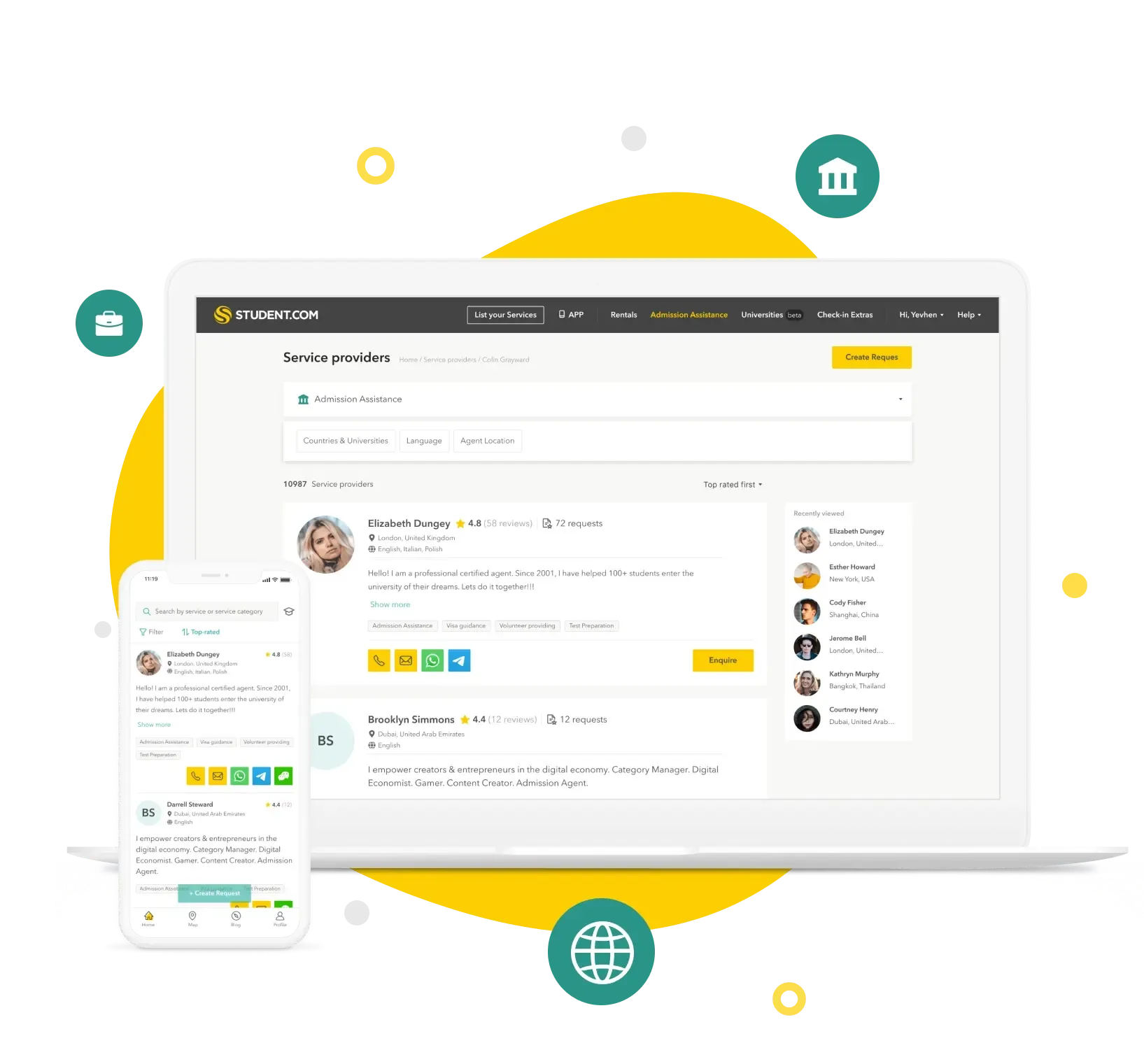Real-time, effective communication is the cornerstone of not only attracting more students, but also staying competitive among universities. With the rising trend of remote learning, systematic, reliable, and efficient communication has become a fundamental necessity.
A higher education CRM system serves as a comprehensive tool that offers both students and staff members a complete view of the entire educational process. It consolidates all your applications, contacts, and interactions into a single, centralized hub.
Tailored CRM platforms for higher education institutions provide invaluable support for applicants. They offer scheduling tools, reminders, and e-signature capabilities, simplifying the application process for students. With the insights and features at your disposal, you can gain a deeper understanding of the needs of students, staff, and alumni.
We suggest delving into the 11 primary advantages of customer relationship management in higher education.
In this article:
What is a CRM for higher education
Remember how businesses used to store customer information? In telephone books, Excel tables, diaries, and card files. It was uncomfortable. All these carriers could be lost at a moment, and it was quite difficult to organize information in them or find it quickly. It was possible to restore the entire history of relationships with the client only from memory or by collecting all the records together.
Almost the same approach was used in education. The methodologists manually drew up timetables, all information about the students was stored in journals, and the educational process itself could not be imagined without a physical presence in the classroom. Fortunately, those days are over.
For everything to run like clockwork and to run quickly, it is necessary that information about each student and teacher be entered into a common database. In this case, the search for it should be fast, and the updating of information should be simple. All work tasks and timetables should also be kept in a convenient form and be easily available and modifiable at any time. All these functions and many others are implemented in modern CRM for the education industry.
The higher education CRM serves as a unified interface that consolidates all information related to university operations. It operates within a single integrated CRM platform information environment, allowing direct or restricted access to an extensive database covering a wide range of data. This database houses records for every applicant, student, and graduate, encompassing details such as grades, test scores, coursework and dissertation data, interactions with instructors, and financial transactions related to contract-based tuition.
The significance of CRM systems in higher education extends to:
- Class scheduling and educational progress tracking. These systems facilitate the organization of class schedules and provide detailed insights into the entire student journey.
- Individual student and teacher portals. Both students and teachers have personalized accounts within the CRM, allowing students to upload assignments and receive feedback efficiently.
- Task management and workflow automation. School management software enables the creation of tasks, streamlining business processes, and scheduling work, contributing to more efficient and organized administrative operations.
- Interactive communication channels. They provide interactive communication channels for students, faculty, and staff, fostering collaboration and knowledge sharing.
- Data-driven decision making. CRM platform offers valuable data and analytics, empowering higher education institutions to make informed decisions regarding curriculum development and student support services.
- Enhanced student services. These systems enhance student services by enabling students to access academic information, course materials, and support services seamlessly.
- Admission and enrollment management. They streamline admission and enrollment processes, making it easier for prospective students to apply and enroll in courses or programs.
- Personalized learning experiences. Student information systems can be used to create personalized learning experiences by tailoring educational content to individual student needs and preferences.
- Tracking student performance. These systems assist in tracking student performance, enabling early intervention and support for those who may be struggling academically.
- Parent and guardian communication. These systems also offer a platform for effective communication with parents and guardians, ensuring they are informed about their child's academic progress and the university's initiatives.
This list doesn't encompass all the features showcasing the effectiveness of CRM in student management. Additional functions, including non-standard ones, may also be incorporated with the involvement of developers.
Don't miss out on the future of education — read now!
Explore the latest trends and advancements in EdTech through our comprehensive whitepaper.
Advantages of using a CRM for educational institutions
Thanks to the use of CRM, the conversion can increase up to four times. According to IBM, every dollar invested in CRM implementation brings the organization five dollars in profit. This alone clearly demonstrates the importance of using this system.
Below, we will share the main benefits of CRM for higher education.
1. Reduction in the cost of expenses
One of the main benefits of using a CRM in education is that automation and standardized online learning processes reduce costs by eliminating a lot of routine and manual steps. However, if during the implementation of CRM, the number of routine operations in the higher ed organization processes does not decrease, then the implementation plan requires revision.
2. Improving the quality of the learning process
Enhancing the quality of the learning process is a top priority in higher education. By adopting a student-centric approach, the institution places a strong emphasis on student feedback. This feedback is invaluable in elevating the quality of educational services and programs and increasing student retention and student engagement rates.
3. Improving the organization management process
The use of automation tools helps in the control and management of teachers and other staff. With the help of CRM for university technologies, you can get data on the effectiveness of each of your teachers and students.
4. Streamlined admission process
CRM platform allows you to leverage the power of automation to ensure that pertinent information reaches the appropriate students precisely when it's needed. Your student information system, integrated with CRM for higher education, facilitates the instantaneous dispatch of application reminders, interview schedules, and acceptance notifications.
5. Track and increase the number of potential students
Monitoring and growing the pool of prospective students is essential. When you have established a base of dedicated students, you can be confident that they will refer their friends and peers to your institution. This method of prospective students recruitment often surpasses others in terms of cost-effectiveness and overall quality.
6. Student interaction history
This is another advantage of CRM in the education sector. We've come to expect that our needs are anticipated, and student support is accessible around the clock. To establish such effective processes, a CRM platform is indispensable, as it maintains individual profiles for each student, containing comprehensive information. This student data is organized chronologically, allowing you to access the complete history of student engagement within minutes.


Thank you for Subscription!
7. Timely and visual academic analytics reports
It also offers the invaluable advantage of generating timely and visually informative academic analytics reports. With access to real-time data presented in user-friendly visual formats, educational institutions can effectively track student progress, identify areas that require attention, and enhance the overall quality of the student experience. Such insights empower educators to implement targeted interventions, improving student success rates and ensuring a more responsive and tailored educational environment.
8. Seamless integration with external services
Integrating higher education CRM systems, such as connecting telephony, social networks, SMS notifications, email, and diverse payment platforms, opens up fresh avenues for enhancing the efficiency of interactions between faculty, students, and their families.
9. Planning and multitasking
The CRM platform will not let you miss an important matter, for example, such as congratulating a graduate on the end of the course, or an approaching end-of-course test. In addition, by automating many routine processes, the program saves time and increases the productivity of the entire team of teachers.
10. Easy implementation
Gone are the days when to implement CRM platform you had to call a team of specialists and spend several days on installation. Today, to implement CRM, it is enough to download the installation file from the developer's website or use the boxed version of the product. At the same time, you can work with CRM right away, and teachers & managers can easily master the program while working through an intuitive interface.
11. Elimination of errors in the learning process
The automation of activities within a higher educational institution plays a vital role in reducing errors made by staff in various transactions. These errors might include untimely communications with students or inaccuracies in the calculation of financial aid. There are numerous instances in the academic world where such oversights have significant implications.
Main features of CRMs for colleges and universities
Collecting information and student registration
The CRM solution comprehensively records all interactions among students, their families, teachers, and higher education institution document management & contact management. This software enables the tracking of communication history, educational background, academic performance, and more.
Planning and analysis
Another vital CRM for higher education function is the capacity to gather detailed statistics on all processes within colleges and universities. Through complex reporting, the system provides insights into identifying organizational issues affecting the entire institution or individual students.
End-to-end analytics charts a student's journey from admission to graduation, facilitating the evaluation of an institution's effectiveness, pinpointing inefficient processes, and allowing tailored adjustments to individual student education programs.
Personnel management
Upon CRM for higher education implementation, managers gain the ability to monitor the activities of each staff member. Teacher workstations display current tasks and feature calendars that automatically highlight due dates.
Company leaders can access faculty or individual employee statistics at any time, evaluate key performance indicators (KPIs), and assign new tasks. The comprehensive statistical data collection also enables workload tracking for teachers and aids in planning substitutes, leaves, and incentives. It also helps to increase student retention rate.
Document flow automation
A valuable higher education CRM software feature involves creating document templates with auto-fill capabilities. When initiating a new transaction, the program generates a document based on the selected template and populates it as the student progresses through the entire educational process.
Document flow automation reduces managerial workload, allowing them to focus on working with teachers and students. It also lightens the load on accountants, automating most calculations and mitigating the risk of documentation errors due to oversight or fatigue.

More interesting insights
How To Build A Learning Management System (LMS) From Scratch
Learn step-by-step how to create your own Learning Management System (LMS) from scratch, customizing educational tools for effective teaching!
Read more5 best CRM for higher education
Salesforce Education Cloud
Education Cloud comprises a suite of software products and solutions engineered to streamline educational processes, spanning from primary and secondary schools (K-12) to higher education institutions (Higher Ed). It leverages the world's leading system to manage relationships, providing a holistic, 360-degree perspective of each student's educational journey.
At its core, Education Cloud operates on the Education Data Architecture (EDA). This architectural framework, initially tailored for higher ed, was collaboratively developed by Salesforce partners specializing in education and shaped by input from the Trailblazers community. EDA seamlessly integrates both standard and custom objects into Salesforce, equipped with diverse functionalities that cater to the unique characteristics and requirements of the educational sector.
TargetX
TargetX is the best CRM software for higher education that empowers admissions processes to transition to a paperless environment while also centralizing and streamlining the application review process. The TargetX Application Review tool enables remote, independent, and paperless application review, eliminating the need for physical paper applications and heavy folders. It offers a clean and comprehensive view within the CRM, where reviewers can access and evaluate all applicant materials, such as test scores, letters of recommendation, and transcripts.
By utilizing predefined rubrics and scoring systems, institutions can ensure a data-driven review process, facilitating collaboration and enhancing the efficiency of the admissions process, ultimately leading to the student enrollment of the most suitable incoming class.
FullFabric
FullFabric is one of the best higher education CRM solutions designed to support universities and graduate schools in managing the entire student lifecycle. This software not only places a strong emphasis on user-friendliness and aesthetics but also offers functional excellence. Beyond visual appeal, they've focused on facilitating seamless alumni engagement with faculty, providing tools for marketing campaigns and enhancing brand visibility, meeting their objectives.
The software also promotes collaboration between program affairs and faculty to ensure the best possible student experience while addressing the increasing importance of visibility, accountability, and mobility in today's work environment.
Zendesk
Zendesk is a higher education CRM system designed to simplify support requests within institutions or departments. It consolidates these requests into a user-friendly interface, eliminating the need for hardware, IT maintenance, or extensive training. With Zendesk, you can effortlessly handle requests and establish a knowledge base for frequently asked questions (FAQs). This means you can shift your focus from managing a flood of queries and navigating intricate IT tools to the primary task of assisting your students and staff.
Zoho CRM
Zoho CRM is a cloud-based solution tailored for automating management functions within the student lifecycle in higher education organizations. With Zoho CRM, educational organizations can seamlessly manage interactions with students, faculty, and external partners and access comprehensive analytics. This CRM software serves to optimize administrative tasks, centralize teacher and student data, organize event management, and facilitate data-driven decision-making.
Our experience in edtech development
Student: an e-learning platform
In collaboration with the Student.com internal team, Geniusee introduced an innovative solution designed for both learners and educators. This platform serves as a unifying hub for prospective international students, educational agents, and various entities engaged in university application preparations.
Geniusee played a pivotal role in crafting this platform, where students can seamlessly discover knowledge providers, make selections, and complete payments for their chosen expertise, while tutors can offer their services. This student-centric approach earned the platform a remarkable 79th ranking among 110,718 global solutions, firmly establishing it as a sought-after product in the competitive EdTech industry.
Primary challenges encountered:
- Establishing confidence and collaboration with the client's in-house teams.
- Formulating and incorporating effective personalized communication strategies.
- Addressing intercultural concerns and synchronizing work across teams in varying time zones.
- Establishing and configuring the architecture stack to seamlessly complement the existing infrastructure.
What we offered:
- Minimum Viable Product (MVP) within a six-month timeframe
- Scalable and serverless architecture
- Intuitive UI/UX informed by User Acceptance Testing (UAT)

If you are looking for an educational software development partner – we invite you to explore our case studies, which showcase our expertise in this industry.
Final thoughts
The education sector is evolving rapidly, and the competition for students has grown increasingly fierce. Many institutions can no longer solely rely on price reductions to attract students. Instead, the key battleground now centers on quality metrics, encompassing enhanced service and elevated service standards. In this domain, college CRM software plays a pivotal role.
The CRM approach holds immense promise, and its advantages for educational institutions are undeniable. While advertising was once hailed as the driving force of commerce, today, merely offering a unique course isn't sufficient. It must be personalized and tailored to the specific needs of each student. CRM provides the means to complete the entire student journey by ensuring effective interactions. Higher institutions that adeptly harness CRM technology are poised to outpace their competition in this dynamic landscape.





















